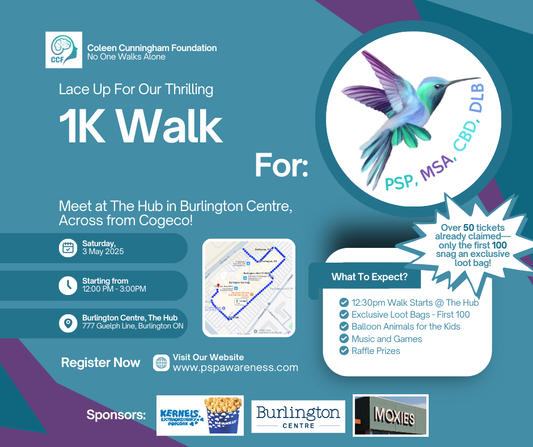Progressive Supranuclear Palsy (PSP) is a complex neurological disorder that affects each individual uniquely. While the journey may differ from person to person, medical professionals often categorize the progression of PSP into four broad stages. In this blog post, we will explore these stages to provide a comprehensive understanding of the disease’s trajectory.
Stage 1: Early PSP
In the early stages of PSP, the symptoms might be quite subtle and easily mistaken for normal aging or other neurodegenerative disorders. Some early signs may include:
- Frequent unexplained falls, typically backwards
- Difficulty with balance and mobility
- Changes in personality, such as increased apathy or mood swings
- Mild issues with eye movement, specifically in controlling upward and downward gaze
During this stage, it's common for individuals to be misdiagnosed with conditions such as Parkinson's disease or even simple aging-related issues. The accurate diagnosis of PSP at this stage can be challenging due to the overlap of symptoms with other conditions.
Stage 2: Mid PSP
As the disease progresses to the mid-stage, the symptoms become more pronounced and start to interfere with daily life. These may include:
- Increased difficulty with eye movements, often leading to blurred or double vision
- Noticeable changes in gait and balance, with frequent falls becoming a major concern
- Difficulty with speech and swallowing, leading to slurred speech and potential choking hazards
- Increased apathy and emotional changes
During this stage, the typical symptoms of PSP become more evident, often leading to a more accurate diagnosis if one hasn't been made already.
Stage 3: Advanced PSP
In the advanced stages of PSP, the symptoms can become severe and significantly affect an individual's quality of life. They may include:
- Severe difficulties with eye movements, sometimes leading to a complete inability to control eye gaze
- Increased difficulty with balance and mobility, often requiring assistive devices for movement
- Severe speech and swallowing issues, often necessitating a modified diet or feeding assistance
- Cognitive issues, such as slowed thought processes and mild memory problems
At this stage, comprehensive care and assistance become crucial for maintaining the individual's comfort and dignity.
Stage 4: Late PSP
The late stage of PSP is the most severe. Individuals at this stage may be largely immobile and require full-time assistance. The symptoms can include:
- Complete loss of eye movement
- Inability to walk or stand, requiring a wheelchair for mobility
- Severe speech and swallowing issues, potentially requiring tube feeding if chosen (always consult with healthcare professionals)
- Significant cognitive impairment
In this final stage, palliative care strategies are employed to ensure the individual's comfort. The focus shifts from treating symptoms to improving the quality of life and providing support to both the individual and their loved ones.
While PSP is a challenging journey, understanding these stages can help patients and their families prepare for the road ahead. A comprehensive, stage-based approach can aid in implementing timely and appropriate care strategies, enhancing quality of life, and fostering hope and resilience along the way.
Although PSP currently has no cure, the value of education, research, community support, and comprehensive care cannot be overstated. Through advancements in medical science and a deeper understanding of PSP, we hope for a future where this condition can be effectively managed, or even cured.
No One Walks Alone!


 Donate
Donate




37 comments
My husband has PSP. The only help we can get is costly. Home health was no help. We are walking alone.
To everyone helping people with this awful disease, I give my deepest prayers. My best friend, who I owe so much to, has had this illness for probably 8 years, but has been in stage 4 for around 3 years and is getting worse. She has a fantastic partner who is an amazing carer, good nutritional food is liquidised and she also takes ENSURE meal drinks as well, I believe this is the reason she has lasted so long. Totally dependent, he can put her into a chair to watch Hearbeat and other programmes, she does seem to enjoy them but verbal feedback at this stage like everyone knows is not possible. She can hear and understand my voice on the phone, and seems to enjoy people talking. How long will my friend be with us ? no one knows as it is impossible to predicate this awful illness. Carers need to be kind to themselves, as you are all doing an amazing job and If your loved could tell you they would. I have mental health problems and am on medication, but I do meditation (which does not come easily to me but I keep trying and have made important inroads),I do different types of exercises and do art. I cared for my mother with Parkinson’s and have just had cancer surgery myself, getting devastating illness is rough and I hope one day they can find better treatments for PSP.
Reading all the comments, the questions, the unknowns bring back all the ugly memories of this horrible disease! My dad has been gone 7 years this October. We tried all the different variations of medication, some worked some didn’t, all eventually became ineffective. He moved though the phases like clockwork, from diagnosis to the end was 6 years. My mom exhausted herself taking care of him, He was the light of my life, and she became my hero. The agitation and inability to sit still doesn’t get better, the inability to speak gets worse, we did have tremendous success with sublingual CBD that allowed Him to regain the ability to speak at a whisper until the year before He passed, then it was ineffective. He did not become confused until the very end, which made it that much more painful to watch, He was aware for most of his decline. My heart aches for those personally dealing with this disease either as care giver or patient. Many prayers coming your way.
My husband was diagnosed in 2021, after knowing something was wrong with him for over a year. We had only been married 3 years when he got sick and I had just turned 50. So far, my husband has progressed rapidly. He know only walks to and from bed to his recliner. I am just wondering if anyone else is as frustrated as I am with extended family. They never some visit him, or call him even monthly much less weekly to check on him. Our family ( my side) has been much more helpful than his. I am so hurt for him and angry… I feel like they have used me as a scape goat not to help out at all. Does anyone else have this situation, or his is family just weird as hell?
I was diagnosed with PSP by a neurologist iñ February 2025. Am digesting what I have read here. Appear to be somewhere between stage 1:2 prevention not being discussed?